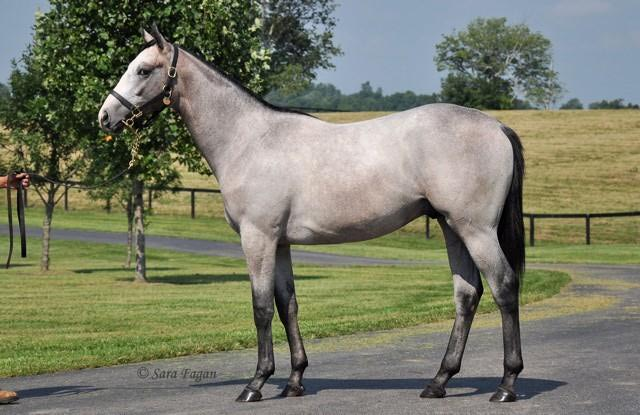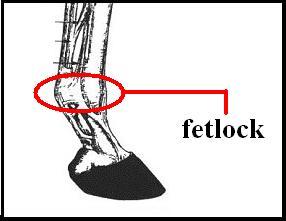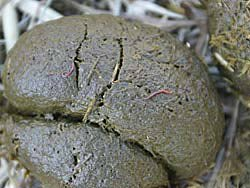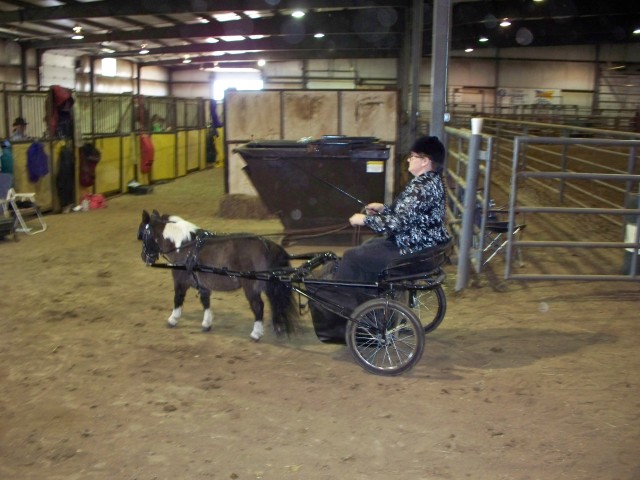QuestionQUESTION: Hi Shelley, I have a 9 year old TB/Quarter Horse cross, his name is Dash, and he is currently in training to be my junior hunter.. He is one of the sweetest most docile horses I have ever met. I am 16 and have been riding for 8 years, I have had Dash almost one year. He has always been the type of horse to try his best to please you but starting last summer anytime I would try to hold him in a frame for a canter transition mostly to the right he will stop and attempt to rear. Nothing mean, just little leaps, sometimes he will paw the ground. He just gets really angry..this anger ruins the rest of the ride. He is so worked up and frazzled that it is almost pointless to try and finish the ride.. One trainer said that he is just a ticked off horse and that when you want him to do something he doesn't want to do he "flips out." Another said that he maybe sore on his right side, particularly his back right leg. But we have had his hocks injected before and we really haven't done much with him that he should be so sore. And regarding him being a mean horse..I disagree..He is not a mean horse although he does have his "bratty" days where he doesn't want to do what you tell him to do..but what horse doesn't have that issue?? I just don't understand why he reacts so badly..Sorry this was so long..Thank you for your time.
ANSWER: Dear Colleen,
Thank you for providing insightful information- definitely no need to apologize. Dash poses an interesting case and I am tending to side with the person who told you his problems may well be physical. Now, having said that- you've said that you have had him for nearly a year but that he started doing this last summer- so if I put this time line together correctly- you hadn't owned him very long before he started displaying this behavior.
I would begin, if possible, by going back to the previous owner or better yet- if the horse was ever with a trainer- the former trainer- and see if you can't do a little detective work to determine if he ever did this before. Now chances are that the owner will be guarded. If he did have a history of being resistant and having tantrums- he/she is probably glad to be rid of him and may be unlikely to share information. You will have to be very tactful about what type of questions you ask. As opposed to being confrontational:"Why didn't you tell me that Dash would lock up on the right rein and rear?" Try being concerned: "I love Dash- but I'm worried that I might be doing something that he doesn't understand- when I canter right and ask for frame- he's being resistant- do you have any suggestions?" You will always catch more flies with honey than with vinegar.
I think you should have your horse looked at by a good equine vet- you say you had his hocks injected- with what and why? If his hocks were fine- then they wouldn't have needed to be injected. Most intra-articular injections last for a finite period of time (products like "Legend") and some (like cortisone) may actually negatively affect the joint with prolonged use over time depending on the concentration used. It may also have nothing to do with his hocks and you might explain to your vet what he is doing and, if at all possible- try and show your vet exactly what he does under saddle- video would help for this. Your vet might suggest physiotherapy or even acupuncture.
Now many horses will lock up on one rein or another and it is usually connected to a lack of balance and, consequently a lack of even strength and muscle through the back and quarters. When they get tired, they get sore, and when they get sore- they become resistant and sometimes downright belligerent. Lots of ground work in side reins (with a supporting outside rein) will help but it's no quick fix- think of it as an equine fitness program. If this is a condition related to strength, balance and behaviour- you are looking at at least four months with lots of ground work- short periods under saddle and firm corrections for the bad behaviour (spank him on that outside quarter and take him to the inside). He's not going to like it much and I have no way of knowing how good your seat is- so if you are concerned about coming off (you DON'T want to teach him that if he's REALLY bad the rider will go away)ask a professional to help you out for a few weeks until he is more submissive.
I hope this helps.
Have a very Happy New Year.
S. Evans
---------- FOLLOW-UP ----------
QUESTION: Hi again Shelley...Thanks so much for the wonderful advice. My mother and I are planning on having Dash looked at by a good vet..but as soon as you said that his problem may be a lack of balance and strength that made sense to me. You see Dash previously came from a trainer who did not take good care of him..he was fed cow feed and lived in small pasture with about 7 other horses. She didn't do much with him...So if this is his problem and I decide to try and work him through it..what all does that entail? All flat work for 4 months, with side reins or draw reins? And what should I be looking for to let him off for that day, what I mean is what should be the goal for each day with him,where I can say "good boy Dash, your done for the day.." What are some good exercises that will help build those muscles up and keep him focused during the ride instead of what we usually do?-small circles at the canter because he tends to be a hot horse and when doing this he pulls out of the circle and stops and refuses to go forward or starts to leap..Another question I have is that if I do work with him, hard, will I begin to see results after a month, to reassure me that theses exercises are working and I'm training him correctly?? Okay, last question, we have him on smartpaks (supplements) is there any muscle relaxer or muscle builder that could help this process?
Thanks so much, Colleen
AnswerDear Colleen:
I will try to address your questions/comments:
1. I think that the vet check should most definitely be priority one. IF he does have some kind of physical injury ANY type of excercise program could easily make the situation worse or cause permanent damage.
2. Draw reins and side reins are NOT the same thing- do NOT use draw reins! Your side reins (and I strongly suggest that you use the type with the rubber ring as it allows him some play and he is less likely to lean on them) should be attached to a surcingle after he has had a lunge and worked off some steam (don't hook him in side reins cold out of his stall- let him have a good 15 minutes to burn off his edge). Use a snaffle with a cavesson and connect the rein so that you have a one to two hole difference from the inside to the outside- remember the side rein is NOT there to force his head into a frame- simply to self school him into realizing that when he relaxes- the contact softens. Don't try to crank his head down.
2. You will not see results in a month- though he may settle into his lunging routine sooner. Imagine that you were beginning a fitness program or recovering after an injury. Four weeks isn't enough time to build muscle mass and more work more often will only cause injury not speed the process. You are looking at a good four months before you will feel/see significant muscle improvement- and you must continue on from there. On the lunge, ideally when it's time to quit- he will blow (snort, call it what you will) and walk in a relaxed manner with his neck long and natural. He will satnd quietly on the lunge circle without turning toward you or waking off. You might only mount up to walk him to cool him out. When you do ride (and I would suggest no mounted work for a good three weeks) do trot only after your lunging session - no canter work at all under saddle and when you do your trots- use the quarter line and the center line- do serpentines and diagonals- leg yields- lots of variety.
When you do begin to introduce the canter after your lunging sessions (after about two months) canter the long tracks- trot the short tracks- ask for lots of transitions- keep the actual canters short. Don't let the problem happen. Hopefully- he will build up his strength over this period of time and he might even forget that he was being belligerent.
If however- he starts to go back to his old ways (let's say that you are at the four month mark and you have been following the conditioning program) and he starts the quitting/rearing business- it might be time to call in professional to ride him through his tantrum. Once you have ruled out a physical problem, a balance/muscle problem and he still persists- then you have an attitude problem and it's time to get help before you get hurt.
3. Unless you live in an area where there is a mineral deficiency in the soil, have a mare in foal or a lactating mare or a breeding stallion- there should be no need for any type of supplement. As long as your horse is getting a good quality horse hay (I'm not a big fan of alfalfa but am a big advocate of timothy)a pelleted or extruded ration- he should be getting all he needs. Since he's hot- he has no need for grain- slowly take him off any grain products. If he's hard to keep weight on- you could use beet pulp (not a fan) or an extruded low carb ration like Step 8 (also known as Hi Fat 20). Most pelleted/extruded rational already contain supplements and unless you vet has advised that your horse specifically needs a supplement- you could be causing arm where you only meant good.
Personally, I would keep away from so- called "relaxers" (many of which are thinly disguised drugs (remember- most pharmaceuticals are "natural") B complexes, Calm and Cool, Quitex- call it what you want if they work-0 it's because they are in some way causing a chemical change in your horse's body chemistry. I'm not a fan of making my horse's behavior dependent on something that come out of a tube or a jar.
I hope this help- long term , permanent solutions take time.
S. Evans

 leg bandages on fore legs
Question
leg bandages
hello maam. this is an ima
leg bandages on fore legs
Question
leg bandages
hello maam. this is an ima
 fetlock protection
QuestionQUESTION: hello madam, how to protect horse fet
fetlock protection
QuestionQUESTION: hello madam, how to protect horse fet
 horse dropping - worms
Question
horse droppings
hello Lyn, i have attac
horse dropping - worms
Question
horse droppings
hello Lyn, i have attac
 round bulged spots
Question
round bulged
hello Lyn, are you able to
round bulged spots
Question
round bulged
hello Lyn, are you able to
 Mini Horse Training
QuestionToughy the mini
QUESTION: Hello (again!)
Mini Horse Training
QuestionToughy the mini
QUESTION: Hello (again!)